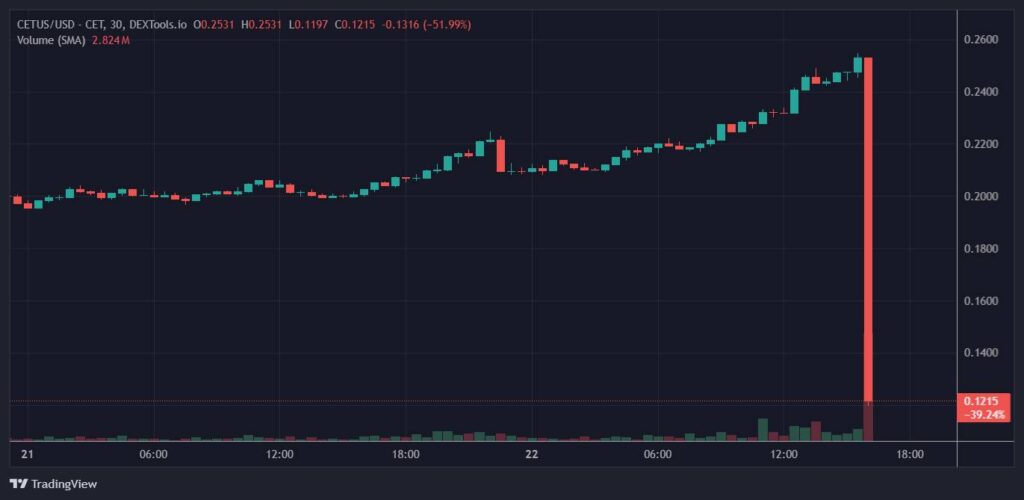The cryptocurrency world is reeling as Cetus Protocol, a leading decentralized exchange (DEX) on the Sui network, has reportedly fallen victim to a significant hack, resulting in a staggering loss of $260 million in tokens. This alarming breach was initially brought to light by the blockchain investigator, Lookonchain, highlighting a wallet associated with the exploit, identified as 0xe28b50. This wallet currently holds over 12.9 million SUI tokens, valued at around $54 million at recent prices.
On-chain data has unveiled that the wallet’s total worth exceeds 32.9 million SUI, approximately $137 million, indicating that the attacker may have already employed various strategies to move or exchange the stolen assets. As the investigation continues, this particular wallet remains active, suggesting that the hacker is likely working to obscure the origin of the funds. The incident underscores the vulnerabilities within Sui’s decentralized finance (DeFi) infrastructure, as numerous major token pools and trading pairs have been drained.
Cetus Protocol has paused its smart contracts and is taking immediate action to analyze the situation. In a recent post on social media platform X, the team assured users of their commitment to safety and transparency, stating that a more detailed report will be issued shortly. Meanwhile, Binance founder Changpeng Zhao (CZ) has offered support to Sui to help mitigate the fallout from this exploit.
In the wake of this incident, the token CETUS has plummeted by 40%, with associated Sui-based tokens like BULLA and MOJO experiencing declines of over 90%. Early investigations suggest that the attacker exploited vulnerabilities in the token’s pricing mechanisms, utilizing spoof tokens to manipulate liquidity and siphon off substantial resources without making appropriate deposits.
Cetus Protocol Hack: Key Points
The recent hack of Cetus Protocol, a decentralized exchange on the Sui network, has significant implications for the crypto community and investors. Here are the crucial aspects of the situation:
- Amount Drained: The hack has resulted in a loss of $260 million worth of tokens.
- Active Exploit Wallet: The wallet associated with the exploit is currently holding over 12.9 million SUI, totaling approximately $54 million.
- Net Worth of the Attacker: The exploit wallet’s total net worth exceeds 32.9 million SUI, roughly $137 million, indicating potential fund movement to obscure traces.
- Impact on DeFi Infrastructure: The ongoing issue strains Sui’s decentralized finance (DeFi) infrastructure due to drained major token pools and pairs.
- Team’s Response: Cetus has paused smart contracts and is investigating the incident; a detailed statement is forthcoming.
- Exploiting Mechanism: The attacker used spoof tokens like BULLA to exploit vulnerabilities in price curves and reserve calculations.
- Manipulation of Liquidity: The exploit involved adding near-zero liquidity while removing substantial real assets without depositing equivalent value.
- Market Reaction: The price of CETUS has plummeted by 40%, while related tokens like BULLA and MOJO have seen declines over 90%.
- Community Support: Binance’s founder, CZ, has offered assistance to the Sui team in addressing the crisis.
This incident highlights the vulnerabilities in decentralized finance systems and may reinforce the importance of security protocols for investors and developers in the crypto space.
Cetus Protocol Hack: Analyzing the Fallout in the DeFi Landscape
The recent breach of Cetus Protocol, the leading decentralized exchange on the Sui network, has sent ripples throughout the cryptocurrency ecosystem. With a staggering $260 million siphoned away, this incident highlights both vulnerabilities and competitive dynamics among decentralized finance (DeFi) platforms. Other DEXs may feel a mixed impact from this situation, ranging from heightened scrutiny to potential market share gains.
Competitive Advantages for Alternative DEXs
While Cetus is reeling from this exploit, other decentralized exchanges can position themselves as safer alternatives. Platforms like Uniswap and SushiSwap may seize the moment to showcase their security protocols, enhancing their reputations as robust environments for trading. As user trust in Cetus dwindles, the spotlight will inevitably shine on exchanges that can prove their resilience and reliability, paving the way for a surge in user adoption.
Disadvantages and Challenges Ahead
However, the fallout from the Cetus incident brings significant challenges to the Sui network and its associated projects. The entire ecosystem is under scrutiny, leading to a potential loss of investor confidence in all Sui-based tokens and projects. Even smaller initiatives could suffer as market participants adopt a risk-averse stance, delaying investments or expansions that are crucial for their growth.
Who Stands to Gain or Lose?
Investors and traders looking for reliable platforms could pivot away from Sui, negatively impacting not only Cetus but also the broader Sui community. Memecoins like BULLA and MOJO, which have already seen massive drops in value, may find it challenging to recover. As these tokens tumble, it’s clear that weaker projects will struggle to regain footing, while more established platforms leverage this opportunity to strengthen their market position.
Ultimately, the actions taken by the Cetus team, including their decision to pause smart contracts and seek assistance from Binance, will be critical in shaping public perception. The next steps could either mitigate further damage or exacerbate existing problems within the DeFi sector on the Sui network.
















